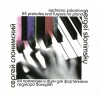| Country: | Russian Federation |
| Period: | Contemporary classical music |
Biography
Sergei Mikhailovich Slonimsky (Russian: Серге́й Миха́йлович Слони́мский, born August 12, 1932, Leningrad) is a Russian and Soviet composer, pianist and musicologist.
He is a son of Soviet writer Mikhail Slonimsky and a nephew of the Russian-American composer Nicolas Slonimsky. He studied at the Musical College in Moscow from 1943 until 1950. From 1950 Slonimsky was at the Leningrad Conservatory. He studied composition under Boris Arapov, Vissarion Shebalin and Orest Yevlakhov, polyphony under Nicolai Uspensky and piano under Anna Artobolevskaya, Samari Savshinsky and Vladimir Nielsen. Slonimsky is a professor at the St. Petersburg Conservatory. While the majority of his students are Russian, Slonimsky teaches a large percentage of the international composition students at the Conservatory from countries including: Colombia, Korea, China, Italy, Germany, Iran and the United States.
Sergei Slonimsky composed more than a hundred pieces: 5 operas, 2 ballets, 32 symphonies and works in all genres of chamber, vocal, choral, theatre and cinema music, including Pesn' Volnitsy (The Songs of Freedom, for mezzo-soprano, baritone and symphony orchestra based on Russian folk songs, 1962), A Voice from the Chorus, a cantata set to poems by Alexander Blok, Concerto-Buffo, Piano Concerto (Jewish Rhapsody), Cello Concerto, 24 preludes and fugues, etc.
Mostly eclectic, he has experimented with a folkloric style as well as with 12-tone techniques and new forms of notations. He has also used forms and styles of jazz and neo-romantic music.









